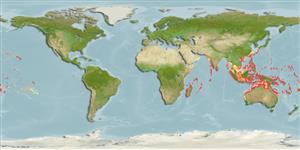Issue
Indian Ocean species refers to C. nigripinnis; reference needed (N.Bailly pers.comm., 02/2019).
Environment: milieu / climate zone / depth range / distribution range
Sinh thái học
Biển Cùng sống ở rạn san hô; Mức độ sâu 0 - 60 m (Ref. 5222), usually 3 - 15 m (Ref. 9710). Tropical; 34°N - 30°S, 33°E - 131°W (Ref. 5222)
Pacific Ocean: eastward to French Polynesia and the Pitcairn Islands, and to Christmas Isalnd in the Indian Ocean
Length at first maturity / Bộ gần gũi / Khối lượng (Trọng lượng) / Age
Maturity: Lm ?, range 17 - ? cm
Max length : 28.0 cm TL con đực/không giới tính; (Ref. 5222)
Các tia vây lưng cứng (tổng cộng) : 9; Các vây lưng mềm (tổng cộng) : 14 - 16; Tia cứng vây hậu môn: 3; Tia mềm vây hậu môn: 8 - 9. This species is distinguished by the following characteristics: greatest body depth 2.7-3.1 in standard length; body scales ctenoid except cycloid scales ventrally on abdomen; rounded caudal fin; pelvic fins usually not reaching the anus, 1.8-2.2 in head length Colour of body reddish brown anteriorly, dark brown posteriorly; caudal fin with 2 white to bluish white bands that converge posteriorly (Ref. 90102).
Adults inhabit clear, shallow waters of outer reef areas, in lagoons, back-reef areas, and on the reef-top. As solitary individuals (Ref. 90102), they prefer healthy coral reef in shallow areas, and are therefore greatly affected by reef degradation (Ref. 89707). They feed on small fishes (68%) and crustaceans. Because of its small size, the darkfin hind is not of much interest as a food fish (except perhaps to subsistence fisheries), but it does well in an aquarium and may find a market as an aquarium fish. They are caught with hook-and-line, gill nets, and in traps (Ref. 39231). Minimum depth reported taken from Ref. 128797.
Life cycle and mating behavior
Maturities | Sự tái sinh sản | Spawnings | Egg(s) | Fecundities | Ấu trùng
Protogyny is unconfirmed for this species (Ref. 103751).
Heemstra, P.C. and J.E. Randall, 1993. FAO Species Catalogue. Vol. 16. Groupers of the world (family Serranidae, subfamily Epinephelinae). An annotated and illustrated catalogue of the grouper, rockcod, hind, coral grouper and lyretail species known to date. Rome: FAO. FAO Fish. Synop. 125(16):382 p. (Ref. 5222)
IUCN Red List Status (Ref. 130435)
Threat to humans
Harmless
Human uses
Các nghề cá: Các nghề cá là sinh kế; Bể nuôi cá: Tiềm năng
Các công cụ
Special reports
Download XML
Các nguồn internet
Estimates based on models
Preferred temperature (Ref.
123201): 25.2 - 29.3, mean 28.4 °C (based on 3224 cells).
Phylogenetic diversity index (Ref.
82804): PD
50 = 0.5000 [Uniqueness, from 0.5 = low to 2.0 = high].
Bayesian length-weight: a=0.01230 (0.00759 - 0.01994), b=3.04 (2.90 - 3.18), in cm total length, based on LWR estimates for this species & Genus-body shape (Ref.
93245).
Mức dinh dưỡng (Ref.
69278): 4.0 ±0.69 se; based on food items.
Generation time: 0.8 ( na - na) years. Estimated as median ln(3)/K based on 1
growth studies.
Thích nghi nhanh (Ref.
120179): Chiêù cao, thời gian nhân đôi của chủng quần tối thiểu là dưới 15 tháng (Preliminary K or Fecundity.).
Fishing Vulnerability (Ref.
59153): Low vulnerability (14 of 100).
Nutrients (Ref.
124155): Calcium = 84.7 [50.2, 180.6] mg/100g; Iron = 0.894 [0.477, 1.805] mg/100g; Protein = 18.6 [16.7, 20.3] %; Omega3 = 0.174 [0.098, 0.316] g/100g; Selenium = 50.5 [24.1, 100.4] μg/100g; VitaminA = 80.9 [29.1, 256.2] μg/100g; Zinc = 0.998 [0.666, 1.731] mg/100g (wet weight);
